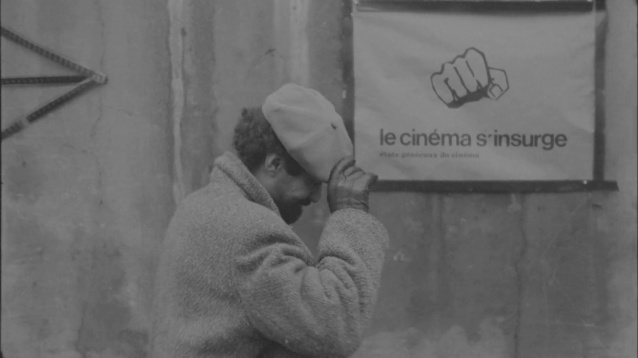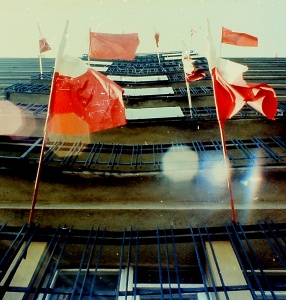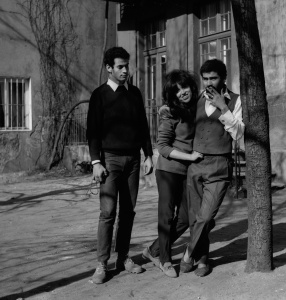"Hope is of a different color"
Film program
“Hope is of a different color” is a film program focused on graduates of the Polish National Film School in Łódź (Lodz Film School) who attended it thanks to scholarship agreements between the Polish People’s Republic (PRL) and what were known as Third World countries. The series consists of short films created between 1966-1990 by students from Morocco, Algeria, Tunisia, Iran, Iraq, Sudan, Kenya, South Africa and Peru.
Study programs for students from Global South countries were one of the key aspects of the Eastern Bloc’s Cold War cultural policies. In October 1960, Nikita Khrushchev inaugurated the Moscow-based Peoples’ Friendship University. The school was renamed Patrice Lumumba University following the 1961 assassination of the Democratic Republic of the Congo’s first prime minister. The university’s mission was educating specialists from the newly independent decolonized nations of Africa, Asia and South America. Similar study programs were also created in other Eastern Bloc nations including Czechoslovakia, the German Democratic Republic and Poland. In addition to their clear function as an element of the ideological rivalry for influence in the decolonized world, these programs also sought to educate the new nations’ leaders in areas including: industry, agriculture, medicine, law and the arts (with an emphasis on visual arts and film). The ability to study in Eastern Bloc nations was created to counter educational opportunities offered by the former colonial empires and the United States’ racist and segregationist policies. A key element of study programs behind the Iron Curtain was the fact that scholarships were often awarded to students from lower social classes, and provided them with the opportunity for rapid social and professional advancement within the structures of their newly independent countries. Economic aid to the Global South countries also provided practical benefits for the host countries. The industrialization of the post-colonial states created new markets for products manufactured by Eastern Bloc nations, while the resulting political, economic and military alliances expanded their global influence.
Film played a particularly significant role in cultural exchanges with Third World nations. Film studies offered or the Eastern Bloc, assistance in the development of the new nations’ film industries provided the ability to shape the new local intellectual elites’ ideological attitudes and popularized socialist ideas. For the African and Middle Eastern nations which lacked their own film industries (and possibilities to offer film education), film was a sought- after means of communicating with society, where literacy rates were low. It was also a means of education, agitation and information – all necessary elements in building new societies.
At the time, scholarship programs were offered by all of the major film schools in Eastern Europe. They included: Moscow’s All-Russian State University of Cinematography (VGIK) - then known as the All-Union State University of Cinematography, Prague’s Film and TV School of the Academy of Performing Arts (FAMU), the Film University in Babelsberg (HFF) and the Lodz Film School. Students from the newly independent developing world countries were particularly interested in documentary filmmaking programs. This specialization gave them the opportunity to shape their nations’ cinematography upon their return home.
The PRL’s Ministry of Foreign Affairs was responsible for directing students from Third World nations to the Lodz Film School. Upon arrival, the would-be filmmakers were provided with stipends which were the subject of governmental agreements between the PRL and their countries. Prior to beginning their studies, scholarship recipients had to complete a year-long Polish language course at the University of Lodz School of Polish for Foreign Students.
The aim of the “Hope is of a different color” program is not limited to introducing a broader audience to African, Middle Eastern, Asian and South American cinematography pioneers educated in Poland. The program also brings attention to the matter of intellectual and artistic interactions between Poland and the nations of the Global South inspired by the ideas of solidarity and socialist internationalism. This subject has largely been absent from historical and historical-artistic accounts of the period. The “Hope is of a different color” title also problematizes racial issues which have been practically non-existent in discussions about communism’s ideological legacy. The program’s title is a reference to Abdelkader Lagtaậ’s unfinished 1972 short film But hope is of a different color in which he tells the story of Polish Roma forced to live on society’s fringes because of their ethnic otherness. Lagtaậ, one of the first Moroccan student at the Lodz Film School, presented Polish society’s deeply rooted prejudice and racism – attitudes which had no place in socialist countries’ official doctrines.
21st of Nov, 2019 (Thursday)
-
6 pm
Meeting with the films' creators, Abdelkader Lagtaa and Stanisław Tym. Conducted by: Monika Talarczyk (PWSFTViT). -
7:30 pm
Film screening pt. 1: Images of revolution (60 minutes) – films which directly address the struggle for independence and the decolonization processes in African and Asian nations:
Ludzie z piwnicy [People from the cellar], 1969, 13 minutes
Gdzieś pewnego dnia [Somewhere on a given day], 1971, 21 minutes
Pieśń na śmierć młodzieńców [A hymn on the death of the young], 1973, 11 minutes
Patrik, 1979, 4 minutes
Urodzony w kajdanach [Born in chains], 1983, 2 minutes
Cień wśród innych [ A shadow among others], 1969, 5 minutes 32 seconds
Amghar, 1968, 4 minutes 4 seconds.
21st of Nov, 2019 (Friday)
-
7 pm
Film screening pt. 2: Blackness and race in the PRL (60 minutes) – discusses issues of race in Poland’s largely monoethnic and overwhelmingly white society and address questions of structural racism which were excluded from officially-sanctioned narratives:
Lekcja 41 [Lesson 41], 1966, 7 minutes
Adopcja [Adoption], 1968, 4 minutes
Zofia i Ludmiła [Zofia and Ludmiła], 1971, 9 minutes
Antropologia [Anthropology], 1982, 5 minutes 30 seconds
Nord-Sud, 1990, 10 minutes
Nadzieja [Hope], 1989, 10 minutes
Prolog [Prologue], 1979, 14 minutes.
-
8:30 pm
Film screening pt. 3: A familiar ‘Other’ (55 minutes) – films which attempt to include discussions of ‘otherness’ within a familiar and recognizable context; here issues of the underprivileged, otherness and exclusion affect women, the disabled and the elderly:
Wieczorna klasówka [Evening test], 1966, 7 minutes
Dom rencisty [Retirement home], 1969, 3 minutes
Marta, 1969, 6 minutes
Elżbieta K., 1973, 12 minutes
Małżeństwo Nastarowiczów [Mr. and Mrs. Nastarowicz], 1975, 3 minutes 30 seconds
Ciało [Body], 1984, 6 minutes
Ale nadzieja jest w innym kolorze [But hope is of a different color], 1972, 7 minutes 22 seconds
Wacław A., 1969, 5 minutes 8 seconds.
Directors:
Djamel Benkhaled
from Algeria, a graduate of the Institute of Economic Sciences in Algiers, he studied direction at the Lodz Film School between 1980-84. His short film Antropologia [Anthropology] is included in the program.
Mostafa (Mustapha) Derkaoui
from Morocco, studied direction at the Lodz Film School from 1966-72, his thesis addressed the role of film in the process of changing and shaping of consciousness. His student short films included Adopcja [Adoption], Gdzieś pewnego dnia [Somewhere on a given day] and Ludzie z piwnicy [People from the cellar]. After completing his studies he directed short and feature films in Morocco. His first feature film De quelques évènements sans signification (1974) was recently rediscovered and restored - 45 years after it was blocked by censorship authorities. His prolific artistic career is the subject of The Director’s Chair, Mostafa Derkaoui, a documentary by Sophie Delvallée.
Abdellach Drissi
comes from Morocco, a graduate of École Supérieure d’Art Dramatique in Strasbourg, he worked as a director at the Stefan Jaracz Theatre in Łódź and the Wilam Horzyca Theatre in Toruń. He studied direction at the Lodz Film School from 1964-68 and wrote his thesis about foreign cinematography in Morocco - covering the period from the Lumière brothers up to Jean-Luc Godard’s Le Grand Escroc (1964). His student short film Lekcja 41 [Lesson 41] received awards at the Warsaw Film Festival and the Documentary Film Festival of Łódź. He worked for Polish radio and television and directed theatre plays before returning to Morocco in 1976. There, he joined the Moroccan Cinematographic Center (CCM) as a filmmaker and producer.
Ali Ahmed Abdel Ghayoum
comes from Sudan, an arts graduate of the University of Khartoum, he studied direction at the Lodz Film School between 1973-79. His short film Małżeństwo Nastarowiczów [Mr. and Mrs. Nastarowicz] is included in the program.
Faycal Hassairi
from Tunisia, studied direction between 1987-1991, his thesis discussed the role and functioning of cinema in Tunisian cultural policies. His student short films include: Nadzieja [Hope](1989) and Nord-Sud (1990). Had a brief acting role in W. Pasikowski’s movie Kroll . Currently, he produces documentaries, television shows and commercials for European and Arab television. Producer and cinematographer of the 2006 Israeli documentary feature film Since You've Been Gone and producer of 2010’s Aisheen (Still Alive in Gaza).
John Alex Karanja
(also known as Jam Karanja) from Kenya, a graduate of the film program at Kenya Institute of Mass Communications in Nairobi, he studied film direction at the Lodz Film School between 1981-87. His thesis focused on black filmmakers’ place in cinematography. His student short Urodzony w kajdanach [Born in chains] is part of the program. He was a well-known human rights activist in Kenya.
Idriss Karim
from Morocco, studied direction at Lodz Film School from 1967-73 where his thesis covered the British documentary film tradition. He was a graduate of the International Theatre Institute in Paris and had already worked as a documentary filmmaker in Morocco in the late 1960s. During his studies he was a director’s assistant at the Stefan Jaracz Theatre in Łódź and headed the Polish section of the Union of Moroccan Students. His student documentaries represented the Lodz Film School at festivals in Leipzig, Oberhausen, Nyon and Locarno. Following his studies and subsequent difficulties with Moroccan authorities he moved to France. Karim’s student short films include: Marta, Elżbieta K. and Pieśń na śmierć młodzieńców [A hymn on the death of the young].
Abdelkader Lagtaa
from Morocco, studied direction at the Lodz Film School from 1967-71, his thesis dealt with direct cinema. He directed the student short film Wacław A. During his studies in Poland he continue to write poems and appeared in Souffles, an independent Moroccan review published by leftist intellectuals. He was also a regular collaborator of Galerie Adres in Łódź with the artists Andrzej and Ewa Partum, and a political activist affiliated with UNEM (National Union of Moroccan Students). After his return to Morocco in 1975, he worked for the national television and the national cinematographic center (CCM) before starting his career as independent filmmaker and writer. He’s best known for his film Un Amour à Casablanca (1991).
Beverly Joan Marcus
from Republic of South Africa, studied direction at the Lodz Film School between 1978-82. Directed student short films Patrik and Poczekaj, poczekaj [Wait, wait].
Eduardo Coronaro Quiroga
from Peru, studied direction at the Lodz Film School between 1978-83, his thesis was an anthropological essay on the poetics of educational films. Author of the 1979 student short-film Prolog [Prologue].
Kaweh Pur Rahnama
(1937-2012), from Iran, a graduate of the National Academy of Theater and Film Arts in Sofia. He studied direction at the Lodz Film School between 1964-69 and completed a thesis on contemporary Iranian cinematography. In 1969 he directed the feature-length Nie ma powrotu, Johnny [There’s no going back Johnny] which was a fictional story set in the realities of the war in Vietnam. He was a long-time lecturer at the Faculty of Oriental Studies at the University of Warsaw, a glottodidactic scholar, the founder of Iranian studies in Warsaw and author of Persian-language textbooks. Perhaps best known for his novels which include: Dziesięciu Irańczyków i trup w Warszawie [Ten Iranians and a corpse in Warsaw, 2006], Miłości na imię Sufi [Love’s name is Sufi, 1998] and Mitra (1988). His student short film Wieczorna klasówka [Evening quiz] is part of the program.
Mohamed Ben Said
(also known as Hamid Bensaïd), comes fromMorocco. Studied direction at the Lodz Film School between 1968-71, his thesis discussed the role of props in cinema. His student short films include: Zofia i Ludmiła [Zofia and Ludmiła] and Dom rencisty [Retirement home]. He was also an actor, an assistant to filmmaker Noël Burch and an assistant to Henri Langlois at the Cinémathèque Française. After completing his studies he became a filmmaker at the National Television in Morocco. He co-directed Maarouf Ntamjloutch ou le rite du Ligoté with the sociologist Paul Pascon. His film Zofia and Ludmiła was a selection at the 1973 Nyon International Film Festival.
Samir Zedan
comes from Iraq, political refugee, studied direction at the Lodz Film School between 1982-85 and 1997-98. He directed student short films Ciało [Body], Powietrze [Air] and Niema [Mute].
Curators:
Magda Lipska
is a curator and art theoretician. Since 2008 she works at the Museum of Modern Art in Warsaw. Her recent curatorial projects include: NIEPODLEGŁE: Women, Independence and National Discourse (2018), Danwen Xing. A Personal Diary (2017), Lest the Two Seas Meet (2015), co-curated with Tarek Abou El Fetouh and After Year Zero (2015), co-curated with Anselm Franke, Annett Busch, and Heidi Ballet. She is also a co-founder, together with Annett Busch and Marie-Hélène Gutberlet, of „Women on Aeroplanes” – a research platform tracing the political and artistic under-representation of women in the African liberation movements.
Lea Morin
curator and independent researcher. She is a co-founder of the Atelier de l’Observatoire (Art and Research, Casablanca). She was formerly a programmer and director of the Cinémathèque de Tanger. Her practice primarily focuses on the conceptualization and realization of shared spaces for research, taking the form of workshops, seminars, exhibitions, screenings, publications, film restoration and educational programs. Her research explores archives, history and film heritage from North Africa, seeking to trace possible historiographies based on the absent, disappeared or forgotten.
Monika Talarczyk
film scholar, Associate Professor at the Lodz Film School. She specializes in the history of Polish film and minority cinema (women's cinema). Her publications include three books dedicated to women film directors: All about Eve. Barbara Sass's Films and women's cinema in the 2nd half of the XX century (2013), Biały mazur. Kino kobiet w polskiej kinematografii (2013), Wanda Jakubowska. Starting Anew (2015) and numerous review articles and essays on cinema. In 2014 she received the Polish Film Institute Award. She was nominated for the "Kino" film magazine’s Award twice. She regularly collaborates with Krytyka Polityczna review and is an advocates for gender balance in the film industry. She is a member of EWA (The European Women's Audiovisual Network)., the Women of Film movement, the Society of Polish Female Filmmakers and FIPRESCI.


